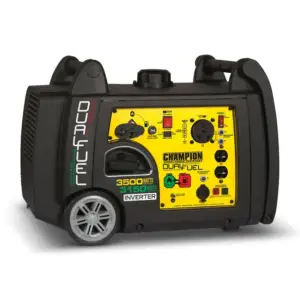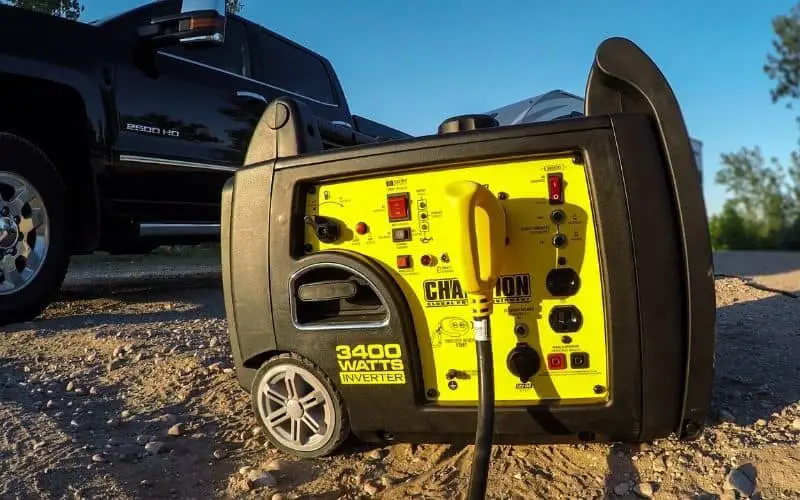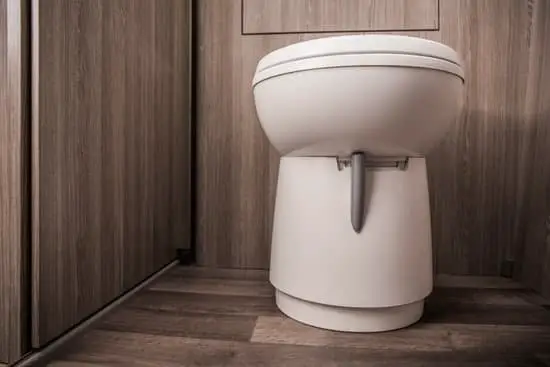5 Best Portable Inverter Generators For RVs
Buying an inverter generator for RV use gives you portable power you can rely on.
You may not always have the ability to plug into an electrical stand at an RV park to have a reliable power supply for your appliance and electronics.
If you haven’t invested in solar power for your RV air conditioner, an inverter generator is the best way to power large RV appliances.
Most portable inverter generators provide enough power to start and run a standard RV air conditioning unit with no problem.
But you’ll need to know exactly how much wattage your appliances draw before you select a quiet and portable generator for RV use.
If you don’t, you’ll risk wasting money on a portable generator that doesn’t meet your RV’s power needs.
Fortunately, we’ve done all of the research for you! Sorting through portable generators can be exhausting, but we’ve distilled things down to help you make the best choice for your RV.
In this article, I’ll review five excellent choices for the best inverter generator for RV use and offer a comprehensive breakdown of the most important factors to consider when buying an inverter generator for camper and camping.
I’ll conclude with a targeted section to help you choose the best generator for YOUR needs and answers some of the most frequently asked questions about portable inverter generator for a camper.
5 best portable Inverter generators For RVs And Camping In 2022
Before we get into these reviews, please note that each of these generators is best suited to a particular use.
Be sure to read through the Buying Guide below to get a better idea of how to choose a generator that’s right for you!
Read on for ratings and reviews of this year’s very best portable inverter generators for RVs.
1. Best Overall: Champion 3500-Watt Dual Fuel RV Ready Portable Generator


If you’re willing to spend what it takes to get the absolute best portable generator for campers and camping, don’t overlook the Champion 3500-Watt Dual Fuel Inverter Generator.
I love this camper generator because it can run on either gasoline or propane, depending on which fuel type is more accessible to you.
This is a great feature to keep your fuel costs down as well. You’ll be able to run this generator on whichever fuel (gas or propane) is more affordable in your area.
And it provides great power output when running on either fuel source.
This travel trailer generator provides 3500 watts of power when running on gasoline and a maximum of 3200 watts when being powered with propane.
With a 1.6-gallon fuel tank capacity, the Champion portable Inverter generator has a run time of up to 7.5 hours at a quarter load when running on gasoline and up to 14.5 hours at a quarter load when running on propane.
A few other features of this Champion generator that are worth mentioning include parallel capability and a quick control panel for easy access to all controls.
You can also flip this generator into Economy Mode to reduce fuel consumption, increase engine life, and reduce noise output.
Things We Like
Things We Don’t Like
For a more compact RV inverter generator that still offers a large fuel tank, check out the Briggs & Stratton P3000 PowerSmart Series portable generator.
This portable RV generator will run for up to 10 hours at a quarter load with its built-in 1.5-gallon fuel tank capacity.
As someone who likes to know how their appliances are working for them, I really like the fact that the P3000 has an LCD display.
This display makes it easy to view and analyze your generator’s performance. It also alerts you to maintenance reminders so that you don’t overwork your generator.
This portable camper generator can provide 3000 starting watts and 2600 running watts.
This portable generator is typically proficient for smaller RV appliances, but might not allow you to start and run a large RV air conditioner, which is why this generator offers parallel capability.
With a recommended parallel connector kit, you’ll be able to hook up two of these generators to provide enough power for larger RV appliances like your air conditioner.
This RV generator also includes Quiet Power Technology, which reduces noise output to just 58 decibels when operating at a quarter load.
Things We Like
Things We Don’t Like
3. Best Budget: Ryobi 150-Watt Small RV Inverter Generator
If you want to spend less than $100 on an inverter generator, check out this small and portable Ryobi 150-Watt option for campers and camping.
It’s a super small and compact camping generator that weighs less than one pound and recharges using an 18V Ryobi battery pack, which is sold separately.
This is a good solution for RVers that regularly need an extra power source for their smaller electronics or appliances.
It won’t provide enough power for your larger appliances like the microwave or air conditioner, but it will take smaller loads of your RV’s internal batteries.
Over-taxing your RV’s electrical system can be commonplace once you start running a lot of appliances at once.
So although this RV generator won’t power larger appliances, it’s great for handling smaller loads so that you don’t overload your RV’s built-in electrical system.
Things We Like
Things We Don’t Like
4. Best For Parallel Capability: WEN 56225i Fuel Shut-Off RV Inverter Generator
For those that already know they’re going to need two smaller inverter generators to meet all of their RV’s power needs, the WEN 56225i Super Quiet 2250-Watt generator offers easy parallel capability so you can run two of these models simultaneously.
Each of these WEN generators provides 2250 starting watts and 1800 running watts.
They can run for up to six hours at a half load and boast a one-gallon gasoline fuel tank capacity.
Efficient fuel consumption can be hard to find in inverter generators, but this one does well.
It has a built-in fuel shutoff feature that uses up all of the remaining fuel in the carburetor before shutting down.
This leaves less fuel sitting in the carburetor and helps to improve the engine’s lifespan.
I also like the Eco-Mode feature on the WEN 56225i because it reduces fuel consumption.
At the same time, this feature helps to extend the generator’s run time and increase the longevity of the engine.
Things We Like
Things We Don’t Like
5. Quietest Pick: Westinghouse iGen2200 Super Quiet RV Inverter Generator
If quiet operation is your highest priority, this compact Westinghouse inverter generator is your best bet.
It produces just 53 decibels of noise output and combines that quiet operation with a long run time. It can run up to 10 hours on its built-in 1.2-gallon gasoline fuel tank.
This quite rv generator is rated to provide 2200 starting watts and 1800 running watts.
It’s very lightweight and the handle on the top makes it easy to move around as needed.
It also offers a convenient control panel for “one-stop” access to all of its essential controls.
As you might have noticed from my previous reviews, I really like a generator manufacturer that has at least thought about the environmental impact of their product.
That’s why I like the fact that this model offers an “Efficiency Mode” that reduces fuel consumption and extends run time.
The Westinghouse iGen2200 super quiet RV inverter generator also offers parallel capability so that you can hook it up to a second generator for additional power output.
It’s in compliance with both EPA and USFS regulations and has an automatic low oil shutdown feature to protect the engine.
Things We Like
Things We Don’t Like
Buying Guide of RV Inverter generator in 2022
Now that I’ve reviewed five of the best inverter generators for RV use, it’s time to dive into how you can select the best one for your needs.
In this Buying Guide, we’ll cover everything you need to know to make an informed decision.
Power Output
Determining your RV’s power needs really depends on the ratings of your electrical appliances and which appliances you plan to run simultaneously.
It’s not recommended to run all of your appliances at once, as that is a sure way to overload your circuit breaker.
The air conditioning unit typically has one of the largest electrical draws of any appliance in an RV.
This is why it can be a good appliance to look at when determining how many starting and running watts you’ll need from an inverter generator.
Many 13,500 BTU RV A/C units require 2750 starting watts and 1250 running watts.
If you have a smaller or larger air conditioning unit, your required starting and running watts will vary.
If you plan to run your A/C with a portable inverter generator, make sure that the generator provides sufficient wattage to handle your unit’s specifications.
Fuel Type
Most of these portable RV generators run on gasoline. Some can run on gasoline or propane. Some even run on diesel fuel.
The last type that I know of actually just plugs into a battery pack to recharge once its power capacity has been depleted.
Fuel type is an essential consideration because fuel will be your biggest continuing cost when you purchase an inverter generator for an RV and camping.
The best fuel type for you will often depend on your area and the fluctuating prices of different fuels in that area.
This is why many users that have the budget to do so will purchase what is called a “dual fuel” inverter generator.
These generators can run on either gasoline or propane, but they do tend to be a little more expensive than models that run on gasoline only.
That being said, it’s great to have the option to always choose the more affordable fuel source if you get one of these generators.
Just be aware that wattage ratings can vary depending on which fuel you’re using to power a dual-fuel generator.
Fuel Tank Size
The size of a generator’s fuel tank plays a partial role in how long it can run. Run time also depends on how much load you place on the generator.
But, in most cases, a larger fuel tank translates to a longer run time. The only downside to a larger fuel tank is added weight to your generator when the tank is full.
If portability is more important to you than run time, you might not place a high priority on buying a generator with the largest fuel tank possible.
Parallel Capability
Parallel capability allows a generator to be hooked up to another (using a connector kit that’s typically sold separately).
Once these two generators are connected, they can provide more power output than each generator is rated to produce individually.
Some of the best RV inverter generators still don’t produce quite enough starting wattage to power up a large RV appliance like your air conditioning unit.
If this is your intention when buying an inverter generator, make sure you choose a model that offers parallel capability.
Noise
Most of these portable RV generators are much quieter than old-school generators. They typically produce somewhere between 50 and 60 decibels when operating.
The exact amount of noise output that a generator produces can vary depending on the load you place on it.
Be careful to look into the fine print to understand how many decibels the generator produces under different loads.
Many of their marketing materials provide a minimum decibel rating based on the generator operating at a quarter load.
So it makes sense for you to understand how much noise that same RV generator will produce at full load.
Portability
Portability is important for anyone that doesn’t plan on permanently installing a generator underneath your RV.
These RV inverter generators range from just one pound up to almost 100 pounds, so there’s a lot of variability in terms of how easy (or hard) it will be to move your generator around depending on the model you choose.
If you’re looking at a heavier inverter generator, make sure it comes with wheels and a convenient handle.
There may still be times when you need to lift it, but being able to roll it the majority of the way will make your life much easier and reduce the risk of injury that can be related to lifting and moving a heavy generator.
The lighter RV generators should still have at least a handle on top to make them easy to move around.
Because there are many different applications for inverter generators, choosing a portable model is a smart choice.
Warranty Information
Because of the price tag associated with many of these RV inverter generators, it’s important to look into the warranty information provided by each manufacturer.
Each one of these camping generators should have some form of warranty to speak of, but the precise details of each warranty will differ.
Understanding the terms of a manufacturer’s warranty is important before you finalize your portable generator purchase to provide power to your RV.
This will dictate your ability to get repairs done on your generator if issues arise. In the worse case, it will also determine whether the manufacturer will replace your generator altogether.
In general, a longer warranty term is better. A longer warranty means you’ll enjoy free repairs and potential replacement for a longer period of time.
A longer warranty also signals the manufacturer’s confidence in their product, which tells you a lot about the quality of the generator before you even buy it.
Price
Deciding on your budget for an inverter generator requires more than just looking at the price tag of the generator itself.
You’ll also need to factor in potential maintenance costs, fuel consumption, and the generator’s expected lifespan.
It should also be noted that online prices can fluctuate very often. If a specific generator is currently just a bit outside your budget, you might wait a few days or check different retailers to find the best deal possible.
So, Which Is The Best Portable Inverter Generator for RVs and Camping in 2022
For anyone that simply wants the best RV inverter generator that money can buy, look no further than the Champion 3500-Watt Dual Fuel Generator. You might even wind up saving some money in the long term because it can run on either propane or gas, depending on which is more affordable.
If you’re looking for an inverter generator with a large fuel tank capacity, check out the Briggs & Stratton P3000 PowerSmart Series. With a 1.5-gallon fuel tank, this generator is capable of running for up to 10 hours at a quarter load and it has an LCD display to tell you when your generator needs maintenance.
Anyone that doesn’t necessarily need a generator to power larger appliances should look at the budget-friendly Ryobi 150-Watt Small Camping Inverter Generator. It’s a great option to take the load of smaller electronics off your RV’s electrical system.
To power a large RV air conditioning unit, you’ll most likely need two inverter generators. One of the best generator options for parallel capability is the WEN 56225i Super Quiet 2250-Watt Inverter Generator. Hook up two of these guys simultaneously for additional power output.
If you really don’t want to bother your neighbors with the sound of your generator running, check out the super quiet Westinghouse IGen2200 inverter generator. When operating, it produces just 52 decibels of noise, which is less than a normal dinner conversation this is the quietest RV generator you can buy.
Frequently Asked Questions
Now that you’ve (hopefully) identified the right inverter generator for your RV use, it’s time to answer a few more of the most frequently asked questions about these generators. This will help you use and maintain your generator properly.
How does an inverter generator work?
To understand the answer to this question, you need to first understand that there are two different types of electrical current: direct current and alternating current (see the movie The Current War for a more complete explanation).
In short, alternating current (AC) is what comes out of our wall outlets and what we use to power our cell phones, computers, tablets, and other small appliances. Inverter generators mimic the power that we typically get from a wall outlet.
This type of generator produces alternating current but it actually converts it to direct current and then back to alternating current before supplying to your RV and/or appliances.
By doing so, inverter generators eliminate the risk of electrical surges, which is why you’ll see many of these generators labeled to provide “clean power.”
What are the benefits of inverter technology?
For starters, inverter technology makes it easier to match the generator’s output with your RV’s power needs.
This technology produces only the amount of current that there is demand for on the circuit. This reduces surge risk and the possibility of electrical damage to your RV and its appliances.
This technology also makes these generators more fuel-efficient. They reserve peak performance for only those moments when it’s absolutely needed, so they aren’t just burning through fuel during the middle of the day when no appliances are running.
That means inverter generators are both environmentally-friendly and friendly to your wallet.
Which are the best brands to buy from?
All of the RV inverter generators in this article come from reputable brands. However, the fine folks at Champion continue to be one of the most well-recognized and respected brands in the generator industry.
Conclusion
A portable inverter generator can fall into that category of RV essentials. You might not use yours for hours on end on every trip, but when other power sources aren’t available, you’ll sure be glad to have it.
It’s better to have it and use it only when needed than to not have it when the moment of dire need arises.
As an RV owner myself, I know how quickly your RV can go from cozy and comfortable to chilly with spoiling food if you don’t have a reliable power supply.
Take this opportunity to prepare ahead of time and get the best inverter generator for RV use!










